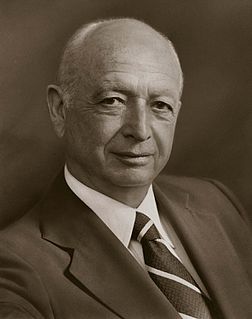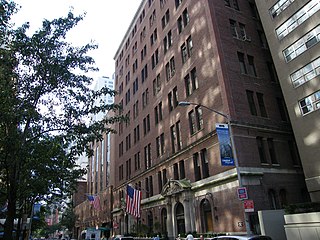Otology is a branch/word of medicine which studies normal and pathological anatomy and physiology of the ear as well as their diseases, diagnosis and treatment. Otologic surgery generally refers to surgery of the middle ear and mastoid related to chronic otitis media, such as tympanoplasty, or ear drum surgery, ossiculoplasty, or surgery of the hearing bones, and mastoidectomy. Otology also includes surgical treatment of conductive hearing loss, such as stapedectomy surgery for otosclerosis.
Graeme Milbourne Clark AC is an Australian Professor of Otolaryngology at the University of Melbourne. He invented a multiple-channel cochlear implant.

A bone-anchored hearing aid (BAHA) is a type of hearing aid based on bone conduction. It is primarily suited for people who have conductive hearing losses, unilateral hearing loss, single-sided deafness and people with mixed hearing losses who cannot otherwise wear 'in the ear' or 'behind the ear' hearing aids. They are more expensive than conventional hearing aids, and their placement involves invasive surgery which carries a risk of complications, although when complications do occur, they are usually minor.

The House Ear Institute (HEI) is a non-profit 501(c)(3) organization, based in Los Angeles, California, and dedicated to advancing hearing science through research, education, and global hearing health to improve quality of life. Established in 1946 by Howard P. House, as the Los Angeles Foundation of Otology, and later renamed for its founder, the House Ear Institute has been engaged in the scientific exploration of the auditory system from the ear canal to the cortex of the brain for over 70 years.

Manhattan Eye, Ear and Throat Hospital is a specialty hospital in New York City that was founded in 1869 and is currently located on the Upper East Side of Manhattan at 210 East 64th Street. After 131 years as an independent entity, in 2000 MEETI affiliated with Lenox Hill Hospital, a 652-bed acute care hospital, established in New York City in 1857 and located at 77th Street in Manhattan. MEETI is recognized in medical circles for its long history of contributions in developing the fields of ophthalmology, otolaryngology and plastic surgery. MEETI provides thousands of patients a year with treatment in its ambulatory surgery facilities.

Cochlear is a medical device company that designs, manufactures and supplies the Nucleus cochlear implant, the Hybrid electro-acoustic implant and the Baha bone conduction implant.

The Vattikuti Urology Institute (VUI) at the Henry Ford Hospital in Detroit, Michigan is a clinical and research center for urological care. The VUI is notable for being the first institute to establish robotic surgery as a treatment for patients with prostate cancer. To date, the VUI has performed more than 5,000 robotic procedures. The institute currently has 110 regular staff members, 19 full-time senior staff members, 14 clinical staff members and 5 full-time Ph.D scientists. Ranked consistently high by U.S. News and World Report, VUI is also one of the largest and most active urology departments in the United States, with nearly 50,000 patients annually from all 50 states and nearly 25 countries.
The Illinois Eye & Ear Infirmary (IEEI) is a center of ophthalmology and otolaryngology research and clinical practice. Currently, the National Institutes of Health (NIH) ranks the department 4th nationally in ophthalmology research funding and 1st in the Midwestern United States and Chicago metropolitan area.
Neurotology or neuro-otology is a branch of clinical medicine which studies and treats neurological disorders of the ear. It is a subspecialty of otolaryngology-head and neck surgery, and is closely related to otology, and also draws on the fields of neurology and neurosurgery. Otology generally refers to the treatment of middle ear disease and resultant conductive hearing loss, whereas neurotology refers to treatment of inner ear conditions, or hearing and balance disorders. These specialists also work with audiologists and related sensory specialists.
Ramesh C. Deka is an ENT specialist and the Ex-Director of All India Institute of Medical Sciences, New Delhi, which is globally recognised as the premier Medical Institute of India. He is one of the pioneers of cochlear implant surgery in India and has performed the country's first bilateral cochlear implantation surgery.

Henryk Skarzynski is a Polish doctor otolaryngologist, audiologist and phoniatrist, creator and director of Warsaw Institute of Physiology and Pathology of Hearing and World Hearing Center in Kajetany.
Hearing Health Foundation (HHF) is a 501c3 nonprofit organization whose mission is to prevent and cure hearing loss and tinnitus through groundbreaking research, and promote hearing health. In 2011, the Deafness Research Foundation changed its name to Hearing Health Foundation.

Mani H. Zadeh is a Otolaryngologist-Head and Neck Surgeon and a member of the American Academy of Otolaryngology–Head and Neck Surgery (AAO-HNS) as well as a Fellow of the American College of Surgeons (ACS). He is considered an expert in minimally invasive surgical procedures and specializes in nasal and sinus disorders. He is the author of numerous publications and has been cited by his peers in the medical field, specifically for endoscopic sinus surgery and septal surgery. He is the founder of the L.A. Sinus Institute and has won numerous awards for his field of medicine.

William Fouts House was an American otologist, physician and medical researcher who developed and invented the cochlear implant. The cochlear implant is considered to be the first invention to restore not just the sense of hearing, but any of the absent five senses in humans. Dr. House also pioneered approaches to the lateral skull base for removal of tumors, and is considered "the Father of Neurotology."

The Bionics Institute is a biomedical research institute focusing on medical bionics. The Institute’s three core research themes are bionic hearing through cochlear implants, bionic vision through stimulation of the optic nerve and neurobionics through deep brain stimulation. The Bionics Institute is located in Melbourne, Australia.
Thomas J. Balkany, M.D. is an American ear surgeon, otolaryngologist and neurotologist specializing in cochlear implantation. He is the Hotchkiss Endowment Distinguished Professor and Chairman Emeritus in the Department of Otolaryngology and Professor of Neurological Surgery and Pediatrics at the University of Miami Miller School of Medicine. Additionally, he is a fellow of the American Academy of Otolaryngology–Head and Neck Surgery, the American College of Surgeons and the American Academy of Pediatrics.
The Hear the World Foundation is a corporate nonprofit foundation founded by Sonova working towards equal opportunities and better quality of life for people with hearing loss. The Foundation operates as grant-giver supporting project-partnerships in four specific areas:
Jitendra Mohan Hans is an Indian Otorhinolaryngologist, medical researcher and the inventor of HANS speech valve for speech rehablitation after laryngeal cancer surgery. He is a founder member of the Cochlear Implant Group of India and has been a part of the Defence Research and Development Organisation (DRDO) sponsored project team that developed an indigenous Bionic Ear in 2014. Born on 27 November 1955, he graduated in medicine from the University of Meerut in 1978 He has served as the Honorary ENT Surgeon to the Prime Minister of India and is a government nominee at Ali Yajur Jung National Institute for Deafness, Mumbai and the All India Institute of Speech and Hearing, Mysore. He is reported to have pioneered the minimally-invasive surgical techniques for cochlear implants and is a member of the advisory boards of the Union Public Service Commission and World Health Organization (WHO). The Government of India awarded him the fourth highest civilian honour of the Padma Shri in 2005, for his contributions towards medicine.

Mohan Kameswaran is an Indian otorhinolaryngologist, medical academic and the founder of MERF Institute of Speech and Hearing, a Chennai-based institution providing advanced training in audiology and speech-language pathology. He is one of the pioneers of cochlear implant surgery in India and a visiting professor at Rajah Muthiah Medical College of the Annamalai University and Sri Ramachandra Medical College and Research Institute, Chennai. He has many firsts to his credit such as the performance of the first auditory brain stem implantation surgery in South and South East Asia, the first pediatric brain stem implantation surgery in Asia, the first totally implantable hearing device surgery in Asia Pacific region, and the first to introduce KTP/532 laser-assisted ENT surgery in India. The Government of India awarded him the fourth highest civilian honour of the Padma Shri, in 2006, for his contributions to Indian medicine.














